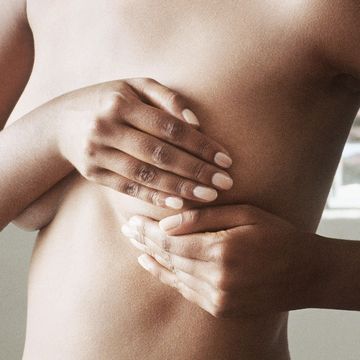You probably already know that what you eat can influence your breast cancer risk—some foods pack good-for-you antioxidants while others can lead to increased estrogen and inflammation. Plus, all experts agree that maintaining a healthy weight can lower your risk of developing breast cancer.
But new research suggests that what you eat after you've been diagnosed with breast cancer is just as crucial. In fact, women with invasive breast cancer who consumed better quality diets had a lower risk of death compared with other breast cancer patients who had lower quality diets, according to a new study in the journal Cancer Epidemiology, Biomarkers & Prevention.
The study included 2,317 postmenopausal women between the ages of 50-79. These women had been diagnosed with invasive breast cancer and completed a dietary questionnaire after their diagnoses, which looked at their frequency of eating, portion sizes, what kinds of fat they were eating, and their usual intake of fruits and vegetables. All the women completed the questionnaire at the beginning of the study and several times after that. After an average follow-up of 9.6 years, 188 women had died of breast cancer while 227 women died of non-breast cancer causes.
MORE: How Your Weight Impacts Your Risk of Breast Cancer
Compared to women with poor quality diets, those with better quality diets had a 26 percent lower risk of death from any cause and a 42 percent lower risk of death from non-cancer causes. Interestingly, they did not find an association between diet quality and risk of death from breast cancer. Diet quality was measured by an index created by the U.S. Department of Agriculture and the National Cancer Institute, which aligned with the U.S. Dietary Guidelines.
MORE: Eating THIS May Decrease Your Breast Cancer Risk
Essentially, this research suggests that adhering to the suggested dietary guidelines can lower your risk of death after a breast cancer diagnosis. While the researchers aren't sure what mechanism was responsible for this link, they did find that women with better diets were also more physically active, reported lower daily calorie intake and lower weekly alcohol consumption, had higher levels of education and income, and had a lower BMI. All of those factors may have played a role in keeping these women healthy.
MORE: The Best (and Worst) Foods to Protect Yourself from Breast Cancer













